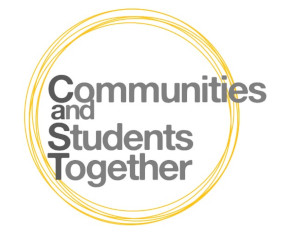NEW! Case Study Compendium now available
The second intellectual output of the Erasmus+ project CaST- Communities and Students Together is now available: the CaST Case Studies Compendium “Engaged Learning in Europe”, coordinated by Ghent University.
The CaST project, supported by the EU’s ERASMUS + Programme, includes partners in six European countries: Belgium, Finland, Germany, Italy, Spain, and the United Kingdom
Following the publication of the CaST State of the Art Report (IO1), where 28 separate examples of Engaged Learning across the six countries were examined, the Compendium “”Engaged Learning in Europe” has taken a more in depth look at one example of Engaged Learning from within each of the six universities represented throughout Europe: Ghent University (Belgium), University of Turku (Finland), University of Magdeburg (Germany), University of Parma (Italy), University of Malaga (Spain) and University of Exeter (United Kingdom).
Highlighted within the Compendium, is the diversity and flexibility to be found within Engaged Learning initiatives. The examples provided range rather widely in their structure and intended outcomes. However, the one constant is each initiative’s commitment to a concept where reciprocity between the students, universities, and communities, is prioritised.
While the examples themselves share little in common, this diversity is a benefit of Engaged Learning and further cements the varied nature across the disciplines and Europe.
Each of the CaST members presents an initiative:
- Belgium: Cannabis Sativa: Process of a Plant. Based on the theatre monologue, developed by UGent collaborator Herman Wolf, a play is performed on stage by a practicing lawyer defending the innocence of his “client”, a cannabis plant. The initiative is curriculum based in both the bachelors and masters level and funded through the University.
- Finland: Localized learning of urban planning and policy in the Baltic Sea Region. This initiative was a series of three courses, organised jointly by University of Turku, Estonian University of Life Sciences, and University of Latvia together with Urban Riga (an urban activism NGO). Each course has the aim to engage students to work with real-life urban planning questions in a locality and develop new ideas or approaches benefitting the local community and the municipality.
- Germany: In:takt store. It is a public, non-commercial, open space in the old town quarter of Magdeburg open to all and is billed as a place of diversity and chance. This initiative has emerged from the cooperation of actors from the OVGU, the city administration of Magdeburg, and local companies (WOBAU, MDCC). In this store, various seminars of different study programmes, institutes and facilities of the OVGU takes place as well as collaborative events which are not directly part of the teaching.
- Italy: Teaching Placement: Teaching without Borders. This initiative involves incoming exchange students from EU countries who would like to teach, who need to carry out their traineeship by teaching in a school, or who just want to have an experience in the Italian school system and fully immerse themselves in the Italian life and culture. Native English, Spanish, French, German, (now also Russian) speakers support foreign language teachers in class activities to help students using the foreign language in their school daily routine.
- Spain: Master’s Degree in Equality and Gender. It is a multidisciplinary qualification at the University of Malaga taught by 41 professors from various backgrounds. To complete their internships, which is the Engaged Learning component of the course, students enrolled in the Humanities itinerary collaborate with many community stakeholders (different immigrant or women's associations). The internship culminates in a final report and postgraduate students are highly encouraged to bring their investigation into the greater community to provide real data for pressing issues today in collaboration with several national and international NGOs, City Hall, Health Counselling, Equality Counselling, Provincial Council, provincial prison, etc.
- United Kingdom: Grand Challenges. It is an initiative that has run at the University of Exeter for a week in June each year since 2013. It attracts over 500 students from across the University of Exeter’s campuses in Devon and Cornwall. The initiative provides students with the opportunity to work on a topic outside of their degree programme, creating innovative solutions to some of the most challenging sustainability-related global problems.
For each of these cases, the Compendium provides an overview of the initiative showing its structure, how the community is matched with it, how it is recourced, its outputs and how it is evaluated. Then the engagement with the partecipants (Students, Community, Staff) is described along with the added value for impact. Finally, each initiative rounds up with conclusions.
The overall Conclusions from Engaged Learning Across Europe, include considerations about Lessons learned and Engaged Learning in the Time of a Pandemic.
Case Studies Compendium "Engaged Learning in Europe"
Also available from the "Download" section of the CaST website.
Archives
- 10/11/2022 - NEW! CaST Anthology now available
- 25/09/2022 - NEW! CaST Toolkit now available
- 04/04/2022 - NEW! CaST FINAL International Conference in MALAGA on April 28th
- 01/04/2022 - NEW! CaST Pilot Synthesis now available
- 25/04/2021 - NEW! Ghent University Podcast on "A dash of SaLT": Discussions with experts on Sociology and Learning Theory in today’s society.
- 26/02/2021 - NEW! Case Study Compendium now available
- 25/02/2021 - CaST First On line Symposium on Community Engaged Learning. A follow-up
- 20/02/2021 - An insight on WP2: State-of-the-Art Review
- 19/02/2021 - CaST first symposium on Community Engaged Learning - Thursday 25th February 2021
- 25/11/2020 - Welcome to the CaST project and website
- 24/11/2020 - Next CaST Partner meeting online: Ghent, 26 November 2020

